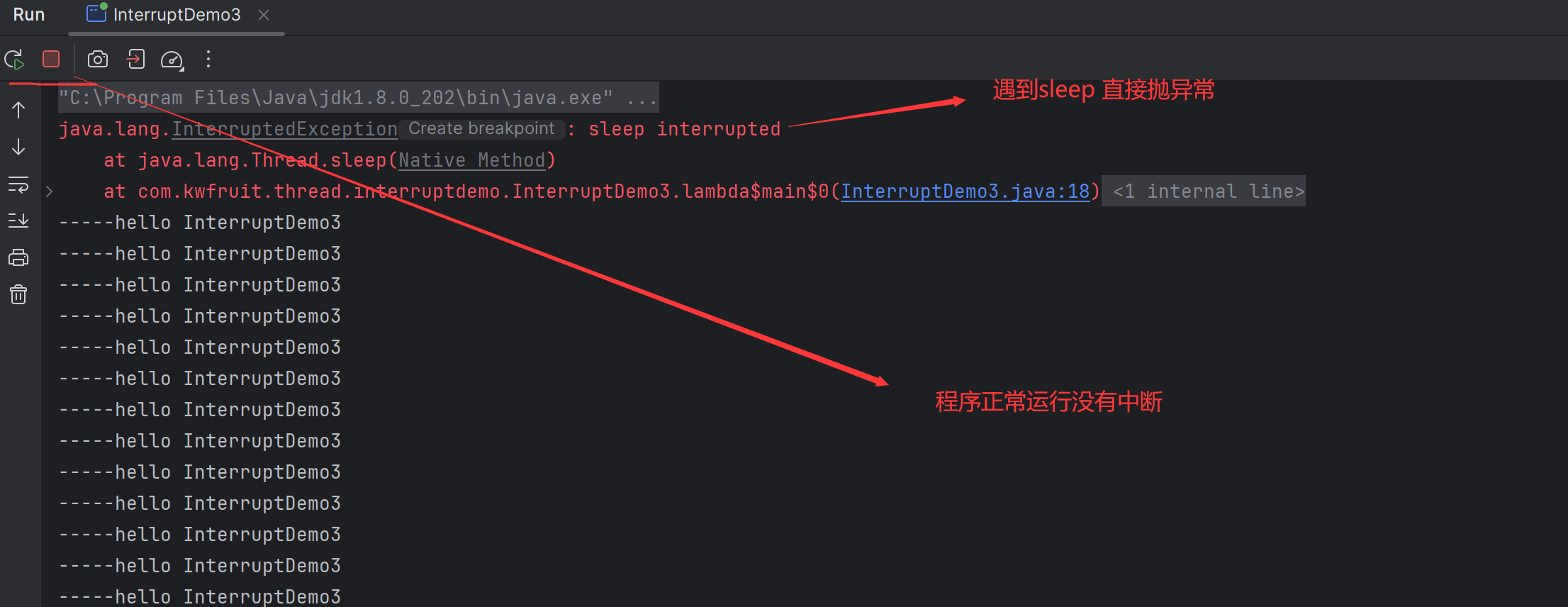中断机制之中断协商案例深度解析 下
说明
具体来说,当一个线程调用interrupt()时:
- 如果线程处于正常活动状态,那么会将该线程的中断标志设置为true ,仅此而已。被设置中断标志的线程将继续正常运行,不受影响。所以,innerupt()并不能真正的中断线程,需要被调用的线程自己进行配合才行。
- 如果线程处于被阻塞状态(例如处于sleep ,wait,join等状态) ,在别的线程中调用当前线程对象的interrupt方法,那么线程将立即退出被阻塞状态,并抛出一个InterruptedException异常。
案例
如果线程处于被阻塞状态(例如处于sleep ,wait,join等状态) ,在别的线程中调用当前线程对象的interrupt方法,那么线程将立即退出被阻塞状态,并抛出一个InterruptedException异常。
设置中断标识,线程读取到标识后自己停止当前线程
package com.kwfruit.thread.interruptdemo;
import java.util.concurrent.TimeUnit;
public class InterruptDemo3 {
public static void main(String[] args) {
//实例方法interrupt()仅仅是设置线程的中断状态位为true,不会停止线程
Thread t1 = new Thread(()->{
while (true){
if(Thread.currentThread().isInterrupted()){
System.out.println(Thread.currentThread().getName()+"\t 中断标志为:"+Thread.currentThread().isInterrupted()+"程序停止");
break;
}
System.out.println("-----hello InterruptDemo3");
}
},"t1");
t1.start();
try {
TimeUnit.MILLISECONDS.sleep(2);
} catch (InterruptedException e) {
e.printStackTrace();
}
new Thread(()->t1.interrupt(),"t2").start();
}
}
-----hello InterruptDemo3
-----hello InterruptDemo3
-----hello InterruptDemo3
-----hello InterruptDemo3
t1 中断标志为:true程序停止
Process finished with exit code 0
设置中断标识后,让目标线程sleep 会抛异常
package com.kwfruit.thread.interruptdemo;
import java.util.concurrent.TimeUnit;
public class InterruptDemo3 {
public static void main(String[] args) {
//实例方法interrupt()仅仅是设置线程的中断状态位为true,不会停止线程
Thread t1 = new Thread(()->{
while (true){
if(Thread.currentThread().isInterrupted()){
System.out.println(Thread.currentThread().getName()+"\t 中断标志为:"+Thread.currentThread().isInterrupted()+"程序停止");
break;
}
try {
Thread.sleep(200);
}catch (InterruptedException e){
e.printStackTrace();
}
System.out.println("-----hello InterruptDemo3");
}
},"t1");
t1.start();
try {
TimeUnit.MILLISECONDS.sleep(2);
} catch (InterruptedException e) {
e.printStackTrace();
}
new Thread(()->t1.interrupt(),"t2").start();
}
}


小总结:所以说如上图所示,当调用interrupt()方法时,目标线程调用了sleep()方法 导致线程的中断状态被清除了 变成了false 而代码又在循环里面catch异常 不会打断当前循环,所以只有在catch块里面 在调一次interrupt()方法 在设置一下值 才会打断当前线程。
package com.kwfruit.thread.interruptdemo;
import java.util.concurrent.TimeUnit;
public class InterruptDemo3 {
public static void main(String[] args) {
//实例方法interrupt()仅仅是设置线程的中断状态位为true,不会停止线程
Thread t1 = new Thread(()->{
while (true){
if(Thread.currentThread().isInterrupted()){
System.out.println(Thread.currentThread().getName()+"\t 中断标志为:"+Thread.currentThread().isInterrupted()+"程序停止");
break;
}
try {
Thread.sleep(200);
}catch (InterruptedException e){
Thread.currentThread().interrupt();
e.printStackTrace();
}
System.out.println("-----hello InterruptDemo3");
}
},"t1");
t1.start();
try {
TimeUnit.MILLISECONDS.sleep(2);
} catch (InterruptedException e) {
e.printStackTrace();
}
new Thread(()->t1.interrupt(),"t2").start();
}
}

总结
中断只是一种协商机制,修改中断标识位仅此而已,不是立刻stop打断
本文作者:KwFruit
本文链接:https://www.cnblogs.com/mangoubiubiu/p/17978054
版权声明:本作品采用知识共享署名-非商业性使用-禁止演绎 2.5 中国大陆许可协议进行许可。





【推荐】国内首个AI IDE,深度理解中文开发场景,立即下载体验Trae
【推荐】编程新体验,更懂你的AI,立即体验豆包MarsCode编程助手
【推荐】抖音旗下AI助手豆包,你的智能百科全书,全免费不限次数
【推荐】轻量又高性能的 SSH 工具 IShell:AI 加持,快人一步
2021-01-21 JSR 303 表单校验(一)
2021-01-21 element ui 表单校验(vue)
2021-01-21 layui表单校验